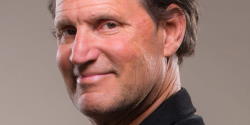This story is part of a package on the one-year anniversary of the COVID-19 lockdown.
A year ago this week, two Bay Area productions about the lives of working-class seamstresses were snipped like a thread when the coronavirus lockdown began: The Lorraine Hansberry Theatre was about to go into previews with a production of Lynn Nottage’s Intimate Apparel, and San Francisco Playhouse was about to go into tech with a production of Real Women Have Curves, to be directed by its playwright, Josefina López.
“There were million dresses and sewing machines and steaming machines sitting there—it was one of the most amazing sets we’ve ever done,” recalled Bill English (he/him) with a sigh in a recent Zoom call. English is the artistic director of the Playhouse, and he was joined on the call by Margo Hall (she/her), the new artistic director of the Hansberry, because the two theatres have come together for a filmed staging of Erika Dickerson-Despenza’s [hieroglyph], to begin airing on Sat., Mar. 13 (it’s up through Apr. 3, with tickets ranging from $15 to $100).

For her part, a year ago Hall was preparing to act in Ellen McLaughlin’s new version of The Oresteia at California Shakespeare Theatre. She even took part, she said, in a festive Cal Shakes gala in early March, “eating and singing and touching utensils and drinking right. No one really knew, right?”
Both the Hansberry and the SF Playhouse are relatively small companies, but one difference is that the Playhouse still has its own space. That’s where, this week, [hieroglyph] is being staged and filmed, with a cast of four but no audience. Though by design it will not be broadcast live, it is being captured in as live a form as possible.
“We shoot it with three cameras, kind of like a sporting event or live television,” said English. “We’re live editing a lot.” Added Hall, who is directing the play, “We’ll do, like, five runs of the play and then we pick the one that works the best.”
There’s one element, though, that will have to rely on an after-the-fact, movie-style edit: a scene of intimacy.

“There’s a bit of hugging and kissing, a little bit of fooling around,” said English “Margo and the playwright Erika felt very strongly that the play would lose a lot of its meaning if it lost the intimacy.” That’s when Susi Damilano, English’s wife and theatre co-founder, began to negotiate protocols with Actors’ Equity. The solution they came up could be the stuff of a play in itself: “The two actors who are doing the intimacy have to be in a hotel, in different rooms, and we have to bring their food to the door for three days. And then the first thing we’ll shoot is the intimacy scene, with just the two of them, and then they can enter the regular population with the rest of the actors.”
Dickerson-Despenza‘s career was on the brink when COVID locked down theatres: Her play about the Flint, Mich., water crisis, Cullud Wattah, was set to premiere at New York City’s Public Theater last July. Water and crisis seem to be recurring themes in the playwright’s work: [hieroglyph] is part of a 10-play cycle, and follows the story of a young girl displaced by Hurricane Katrina. Its prequel, Shadow/Land, will be heard as a Public Theater podcast in April.

[Hieroglyph], which first came to English’s attention via the Kilroys 2019 list, is at heart a father/daughter drama set in Chicago. Its leads are both disoriented refugees from the devastation in New Orleans: The father is trying to convince his wife to move to Chicago, while the teenage girl, Davis, is crying out through her own art about something terrible that happened to her at the Superdome, among thousands of displaced survivors. It’s a play, said Hall, that couldn’t feel more timely.
“Black bodies, especially female Black bodies, have been abused over the years and a lot of it has not been acknowledged or reported,” Hall said. “There have been no prosecutions.” While Dickerson-Despenza’s play calls searing attention “to this idea that Black female bodies are dispensable,” Hall also feels that the play “offers a lot of hope. In the end, the family comes together, the community comes together as a village to take care of Davis.”
The sense of community provided by the theatre remains elusive while lockdown continues. Both Hall and English are philosophical about the prospects of return.
“I think there can be a gradual kind of journey—like, we can start with outdoor theatre,” said Hall. “And then slowly doing maybe two-person shows in a space that is ventilated for 25 people—I can see having boutique audiences, a select group of folks who get tested and say, ‘You’re the first people who get a chance to witness this play onstage live.'”
English zoomed out to consider the future of the Bay Area writ large, and how that might affect the arts.
“In visualizing the future of San Francisco, nobody who works with the big companies is ever going to go back to their office,” English said. “There’s going to be a massive amount of real estate that is empty. I don’t know why that can’t be turned into housing for people with with modest incomes, and then you’d have artists moving into the city and you’d have much more local stuff going on. I feel like the city could be reborn on a much more bohemian level, and that could be really healthy.”
As the Playhouse is fortunate to already have its own space—English said the theatre is not currently paying rent but is meeting maintenance fees of $9,000 a month—the future will also depend on what Hall called “true collaboration. If you’re a theatre with resources, it’s time to hook up with a theatre that doesn’t have resources. That’s what Bill and I are doing here.”
While Hall conceded that the Bay Area is “very strict—there are some places, like Atlanta, where I’m sure they’ll be having theatre going in a couple months,” she added, “The thing about artists, they’re gonna figure it out, they’re gonna find a way to create. You cannot keep us down; we will do a play and Zoom it from our car. So as long as the people can hang in there and be patient with us and keep supporting our work, we’ll be back. I’m very optimistic that it will happen.”
Rob Weinert-Kendt (he/him) is editor-in-chief of American Theatre. rwkendt@tcg.org


